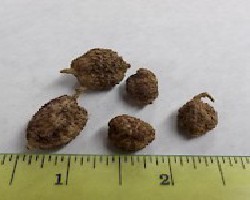Sha Ren - Cardamon
TCM Materia Medica
Sha Ren TCM Herb Classifications and Usages
The TCM herb "sha ren" which in english is  "cardamon", is categorized within the "aromatic herbs that transform dampness" functional grouping. It is thought to enter the spleen and stomach channels and exhibits acrid, aromatic and warm (wen) taste/temperature properties.
"cardamon", is categorized within the "aromatic herbs that transform dampness" functional grouping. It is thought to enter the spleen and stomach channels and exhibits acrid, aromatic and warm (wen) taste/temperature properties.
Dosages and preparations will vary according to each individual and the overall approach of a formula, but generally this herb has the following dosage and/or preparation guidelines:
- Dosage: 1.5-6g (add at end of formula)
Of many possible clinical applications, it may be considered to influence the following issues/symptoms:
- Transforms dampness, stops vomiting - nausea, abdominal pain, diarrhea.
- Promotes movement of Qi, strengthens stomach.
- Calms the fetus, morning sickness.
- Prevents tonifying herbs from causing stagnation. (See also Bai Dou Kou, Yi Zhi Ren)
Sha Ren may potentially be used, in coordination with a well tailored formula (in most cases), to influence the following conditions: abdominal pain, diarrhea, morning sickness and/or nausea
While it may not always be included depending on the manufacturer or herbalist making the formula, sha ren is generally included in the following 6 formulas:
ViewJian Pi Wan (Strengthen Spleen Pills)
For stomach and spleen qi deficiency with dampness that has potentially generated mild interior-heat - diarrhea, abdominal pain, poor appetite, epigastric pain. May be used in early pregnancy for mo…
ViewMu Xiang Shun Qi Wan (Saussurea Qi Promoting Pills)
Bloating, lower abdominal pain, sluggish bowels. Acid reflux/heartburn, nausea with possible vomitting after meals.
ViewShen Ling Bai Zhu Wan (Ginseng, Poria & Atractylodes Pills)
Diarrhea, loose stools, or mucus/greasy stools from damp accumulation in the spleen/stomach. Borborygmus, low appetite, fatigue, and/or pale complexion resulting from spleen qi deficiency. Colitis,…
ViewShu Gan Wan (Liver Comfort Pills)
Abdominal and/or Hypochondriac pain, cramps or spasms resulting from liver qi stagnation. Alternating chills and fever. Nausea, bloating, acid reflux, alternating stools, or IBS like symptoms cause…
ViewXiang Sha Liu Jun Zi Wan (Aucklandia, Amomi & Six Gentlemen Pills)
A modified version of the base, zhi zhu wan, which is used to treat qi stagnation and food retention from qi deficiency. This modification includes herbs which add more movement and damp drying. Di…
ViewXiang Sha Yang Wei Wan (Aucklandia Amomi Nurture Stomach Pills)
Low appetite, apathy towards eating due to spleen qi deficiency. Acid reflux, indigestion, epigastric pain, tendency to feel full even with small quantities of food. Food stagnation due to overeati…
As noted above, sha ren is within the aromatic herbs that transform dampness functional group. All the herbs in this category are listed below.
(truncated intro "... the concept of dampness indicates a damp pathogenic influence which causes stagnation in the middle warmer (i.e. the stomach and spleen channels). general symptoms are - distension and fullness in the abdomen, nausea, vomiting or spitting…)".
All Content 1999-2024
Chad J. Dupuis / Yin Yang House
Our Policies and Privacy Guidelines
Our Affiliated Clinics
